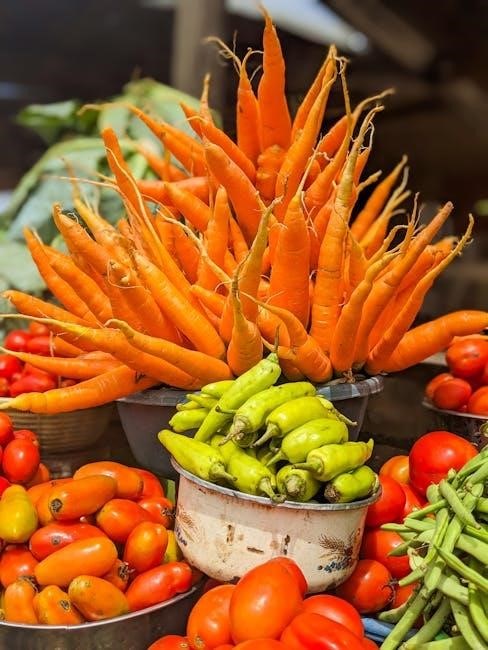Anti-inflammatory foods play a crucial role in reducing chronic inflammation‚ a key factor in many diseases. Incorporating nutrient-rich options like fruits‚ vegetables‚ fatty fish‚ and whole grains can help mitigate inflammation naturally‚ promoting overall health and well-being effectively.

Top Anti-Inflammatory Food Categories
Key anti-inflammatory food categories include fruits‚ vegetables‚ fatty fish‚ whole grains‚ fermented foods‚ nuts‚ seeds‚ herbs‚ and beverages. Each offers unique nutrients like antioxidants‚ omega-3 fatty acids‚ and fiber‚ which help reduce inflammation and support overall health effectively.
Fruits
Fruits are a cornerstone of an anti-inflammatory diet‚ offering a rich supply of antioxidants‚ vitamins‚ and fiber. Berries‚ such as blueberries‚ raspberries‚ and strawberries‚ are particularly potent due to their high anthocyanin content‚ which combats inflammation. Citrus fruits like oranges and grapefruits provide ample vitamin C‚ enhancing immune function and reducing oxidative stress. Apples and pears‚ with their soluble fiber‚ support gut health‚ another critical factor in inflammation regulation. Tropical options like pineapples contain bromelain‚ an enzyme known for its anti-inflammatory properties. Cherries‚ both sweet and tart‚ are celebrated for their anti-inflammatory compounds‚ making them a great addition to meals or snacks. Incorporating a variety of fruits into daily meals ensures a broad spectrum of beneficial nutrients‚ helping to maintain a balanced and anti-inflammatory diet.
Vegetables
Vegetables are a key component of an anti-inflammatory diet‚ offering a wide array of nutrients and compounds that help reduce inflammation. Leafy greens like spinach‚ kale‚ and collard greens are rich in antioxidants and vitamins‚ which combat oxidative stress and inflammation. Cruciferous vegetables‚ such as broccoli‚ Brussels sprouts‚ and cauliflower‚ contain sulforaphane‚ a potent anti-inflammatory agent. Root vegetables like beets and sweet potatoes are high in fiber and antioxidants‚ with beets providing betalains that reduce inflammation. Allium vegetables‚ including garlic and onions‚ are rich in sulfur compounds that support immune function and anti-inflammatory responses. Incorporating a colorful variety of vegetables into meals ensures a broad intake of anti-inflammatory nutrients‚ supporting overall health and reducing the risk of chronic diseases. Regular consumption of these vegetables helps maintain a balanced diet and promotes long-term well-being.
Fatty Fish

Fatty fish are a cornerstone of an anti-inflammatory diet‚ primarily due to their high content of omega-3 fatty acids‚ particularly EPA and DHA. These essential fatty acids are renowned for their potent anti-inflammatory properties‚ helping to reduce inflammation in the body. Fatty fish such as salmon‚ mackerel‚ sardines‚ and herring are among the most recommended due to their rich omega-3 profiles. These fats actively work to lower the production of inflammatory compounds‚ such as eicosanoids‚ which can contribute to chronic inflammation. Regular consumption of fatty fish has been linked to improved heart health‚ reduced joint pain in conditions like arthritis‚ and even brain health benefits. Additionally‚ the antioxidants present in these fish‚ such as selenium and vitamin D‚ further enhance their anti-inflammatory effects. Incorporating fatty fish into your diet‚ ideally 2-3 servings per week‚ is a simple yet effective way to harness their inflammation-fighting potential and support overall well-being.

Whole Grains
Whole grains are a vital component of an anti-inflammatory diet‚ offering a wealth of nutrients that help combat inflammation. Unlike refined grains‚ whole grains retain their bran‚ germ‚ and endosperm‚ providing fiber‚ antioxidants‚ and essential minerals like selenium and magnesium. These nutrients work synergistically to reduce inflammation by promoting a healthy gut microbiome and neutralizing free radicals. Oats‚ quinoa‚ brown rice‚ and barley are particularly notable for their anti-inflammatory properties. The fiber in whole grains slows digestion‚ preventing sharp spikes in blood sugar and insulin‚ which can contribute to inflammation. Additionally‚ whole grains contain phenolic acids and phytochemicals‚ which have been shown to suppress inflammatory pathways in the body. Incorporating whole grains into meals helps replace refined carbohydrates‚ which are often pro-inflammatory. Regular consumption of whole grains is associated with lower levels of chronic inflammation‚ making them a cornerstone of a healthy‚ anti-inflammatory lifestyle. Their versatility in recipes ensures they can easily be integrated into daily meals for sustained benefits.
Fermented Foods

Fermented foods are powerful allies in the fight against inflammation due to their rich content of probiotics‚ antioxidants‚ and bioactive compounds. Yogurt‚ sauerkraut‚ kimchi‚ kefir‚ and miso are among the most potent options‚ each offering unique benefits. These foods undergo a fermentation process that enhances their nutritional profile‚ producing anti-inflammatory agents like short-chain fatty acids. Probiotics in fermented foods support gut health‚ which is closely linked to the body’s inflammatory response. A healthy gut microbiome can reduce inflammation by improving the integrity of the gut lining‚ preventing harmful substances from entering the bloodstream. Additionally‚ fermented foods contain polyphenols and other antioxidants that neutralize free radicals‚ which are known to trigger inflammation. Regular consumption of these foods has been associated with reduced levels of inflammatory markers‚ such as C-reactive protein. Incorporating fermented foods into your diet not only aids in inflammation management but also boosts overall immune function and digestion. Their versatility allows them to be easily added to meals‚ making them a simple yet effective addition to an anti-inflammatory lifestyle.
Nuts and Seeds
Nuts and seeds are potent anti-inflammatory foods‚ offering a rich supply of healthy fats‚ antioxidants‚ and essential nutrients. Almonds‚ walnuts‚ flaxseeds‚ and chia seeds are particularly notable for their high levels of omega-3 fatty acids and fiber‚ which help combat inflammation. These foods also contain antioxidants like vitamin E and polyphenols‚ which protect cells from oxidative damage and reduce inflammatory responses. Walnuts‚ for instance‚ are rich in alpha-linolenic acid (ALA)‚ a type of omega-3 fatty acid that has been shown to lower inflammation markers. Similarly‚ flaxseeds and chia seeds are excellent sources of ALA‚ making them beneficial for heart health and inflammation reduction. Nuts and seeds also support gut health by promoting the growth of beneficial bacteria‚ further aiding in inflammation control. Incorporating a variety of nuts and seeds into your diet can provide sustained energy and support overall well-being. A small handful daily is sufficient to reap their anti-inflammatory benefits‚ making them a convenient and nutritious addition to meals or snacks. Their versatility allows them to be easily integrated into various recipes‚ enhancing both nutrition and flavor.

Herbs and Spices

Herbs and spices are natural anti-inflammatory agents that have been used for centuries in traditional medicine. Turmeric‚ with its active compound curcumin‚ is one of the most well-known anti-inflammatory spices. Ginger‚ another potent option‚ contains gingerol‚ which has strong anti-inflammatory and antioxidant properties. Both turmeric and ginger have been shown to reduce inflammation in conditions like arthritis and muscle pain. Other spices‚ such as cinnamon and cloves‚ also possess anti-inflammatory effects due to their high content of antioxidants. Rosemary‚ known for its rosmarinic acid‚ is another herb that combats inflammation while enhancing digestion. These herbs and spices not only add flavor to meals but also provide significant health benefits. Incorporating them into daily cooking can be an effective way to support overall health and reduce inflammation naturally. Their versatility allows them to be used in a variety of dishes‚ from soups and stir-fries to teas and marinades. Regular consumption of these herbs and spices can contribute to a balanced diet and improved well-being.

Beverages

Beverages play a significant role in an anti-inflammatory diet‚ offering both hydration and essential nutrients. Green tea is a standout option‚ rich in polyphenols like epigallocatechin gallate (EGCG)‚ which has potent anti-inflammatory properties. Similarly‚ turmeric latte‚ often combined with ginger‚ leverages curcumin and gingerol to combat inflammation. Herbal teas‚ such as chamomile and peppermint‚ provide soothing effects and antioxidants that reduce inflammation. Additionally‚ drinkable vinegars‚ like apple cider vinegar‚ contain acetic acid‚ which may aid in reducing inflammation and improving digestion. These beverages are not only refreshing but also contribute to a balanced and health-promoting diet. Incorporating them into daily routines can enhance overall well-being and support the body’s natural anti-inflammatory processes.
Incorporating anti-inflammatory foods into your diet is a powerful way to support overall health and reduce the risk of chronic diseases. By focusing on nutrient-dense options like fruits‚ vegetables‚ fatty fish‚ whole grains‚ and fermented foods‚ you can create a balanced and protective eating plan. These foods are rich in antioxidants‚ omega-3 fatty acids‚ and fiber‚ which work synergistically to combat inflammation and promote well-being. Additionally‚ beverages like green tea and turmeric latte‚ along with mindful portion control‚ can further enhance their benefits. Remember‚ small dietary changes can lead to significant long-term improvements. Adopting an anti-inflammatory lifestyle is not just about preventing illness—it’s about fostering vitality and resilience for years to come.



